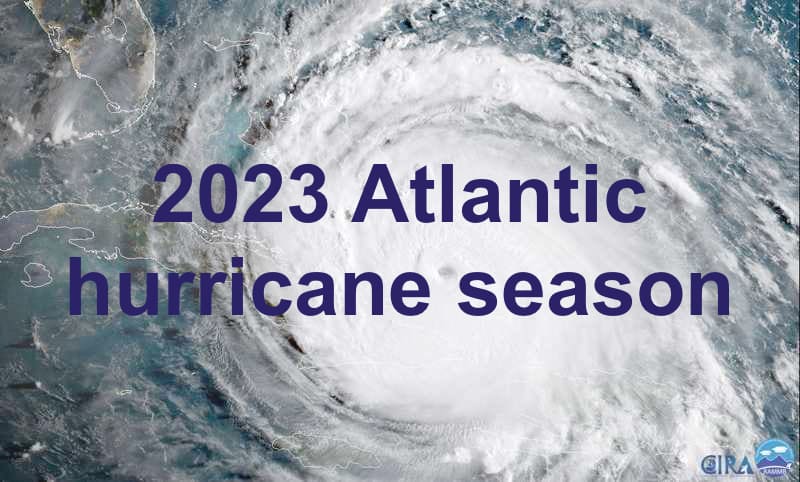2023 hurricane forecast raised again by CSU, higher landfall probability seen

Colorado State University’s tropical meteorology team led by Phil Klotzbach is anticipating a more active 2023 Atlantic hurricane season, with its latest update increasing the number of hurricanes it predicts by 2, with 1 of those expected to become a major hurricane.
It’s now the second time that the Colorado State University (CSU) forecast has been raised for the 2023 hurricane season.
Back in April, the CSU tropical forecast team forecast the season would see 13 named tropical storms, 6 hurricanes and 2 major hurricanes, generating an accumulated cyclone energy (ACE) of 100.
That was below the near-term 1991 – 2020 average of 14 named storms, 7 hurricanes and 3 major hurricanes.
At June 1st, the team incorporated the one unnamed subtropical storm that formed in the Atlantic in January, but also lifted each type of storm by one in its next forecast update.
So, as of the first official day of the Atlantic hurricane season, the CSU forecast was for 15 named tropical storms (so 14, minus the one pre-season subtropical event), with 7 of these expected to become hurricanes (so now increased by one), and 3 major hurricanes of Category 3 strength or greater predicted (again an increase of one).
Now, fast forward another month or so and the particularly warm Atlantic sea surface temperatures (SST) have driven the forecast team to lift its forecast even higher.
Late yesterday, the CSU forecast team gave their latest forecast update, for 18 named tropical storms (so 17, minus the one pre-season subtropical event), with now 9 of them expected to become hurricanes (so increased by 2 more), and now 4 major hurricanes of Category 3 strength or greater predicted (increasing the major hurricane forecast by 1).
The Accumulated Cyclone Energy forecast had jumped to 125 on June 1st, but yesterday’s update lifted it to 160.
This is now a forecast for an above average Atlantic tropical storm and hurricane season, quite the change over the months since April and a reasonable increase in just the last month.
The CSU forecast team commented, “While we continue to anticipate a robust El Niño for the peak of the Atlantic hurricane season, most of the tropical and subtropical Atlantic now has record warm sea surface temperatures. El Niño increases vertical wind shear in the Caribbean and tropical Atlantic, but the extreme anomalous warmth in the tropical and subtropical Atlantic may counteract some of the typical El Niño-driven increase in vertical wind shear.”
Notably for the insurance, reinsurance and insurance-linked securities (ILS) industry, they also said that, “The probability of U.S. major hurricane landfall is estimated to be above the long-period average.”
The CSU team has elevated all of its landfall probabilities, for a major hurricane to hit the coast during the 2023 hurricane season, to:
50% for the entire US coastline, right on the 1880–2020 average (up from 43% at June 1st).
25% for the US east coast including Florida, again right on the average (up from 21% at June 1st).
32% for the Gulf Coast from the Florida Panhandle to Brownsville, once again on the average (up from 27% at June 1st).
With the new CSU forecast update our our Artemis average, across the forecasters we track, now calls for 15 named storms (up 1), 7 hurricanes (flat) and 3 major hurricanes (flat), now slightly above the near-term average for storms.
Remember though, there have now been 3 tropical storms, 2 of which come off the numbers above (as we don’t count the long before season Arlene in our figures.
But, even with those early storms in mind, the forecast for now 9 hurricanes to form, 4 of them becoming major Cat 3 or stronger hurricanes, as well as the elevated landfall probability forecast, should give cause for caution as the season progresses and ensure all eyes are on the tropics as the peak of the season approaches later this summer.
Track the 2023 Atlantic tropical storm and hurricane season on our dedicated page and we’ll update you as new information emerges.







